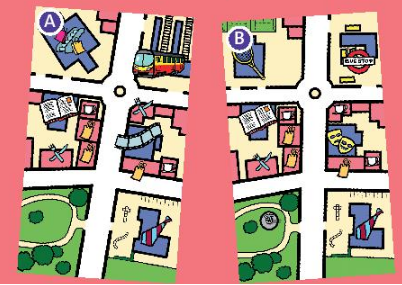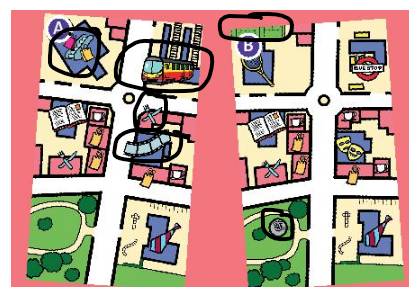Hãy nhập câu hỏi của bạn vào đây, nếu là tài khoản VIP, bạn sẽ được ưu tiên trả lời.

Student A says : “ Sit down, please!” , and student B sits down.
(Học sinh A nói: "Làm ơn ngồi xuống!" , và học sinh B ngồi xuống.)
Student A says: “ Close the door”, and student B doesn’t sit down.
(Học sinh A nói: “Đóng cửa lại”, và học sinh B không ngồi xuống.)

THE YOUNG SPORTS SUPERSTARS PHAN THỊ HÀ THANH Phan Thị Hà Thanh... started....(1. start) gymnastics when she was six. She…went……. (2. go) to an athletic training centre in Hải Phòng. In 2011, she was the first Vietnamese gymnast who…won…….. (3. win) a world medal for Việt Nam and she………competed……. (4. compete) in the Olympic Games in 2012 and 2016. |
MARTIN ODEGAARD Martin Odegaard, from Norway,...became... (5. become) a professional footballer at fifteen and ……scored….(6. score) great goals for his club. He first......played....(7. play) international football before he was sixteen. A lot of famous clubs were interested in him and he……trained…… (8. train) with some of them. Finally, in 2015, Real Madrid………gave… (9. give) him a contract. |
Tạm dịch:
SIÊU SAO THỂ THAO TRẺ PHAN THỊ HÀ THANH Phan Thị Hà Thanh bắt đầu tập thể dục dụng cụ khi lên 6. Cô đã đi đến một trung tâm huấn luyện thể thao ở Hải Phòng. Năm 2011, cô là vận động viên thể dục dụng cụ Việt Nam đầu tiên giành huy chương thế giới cho Việt Nam và cô đã thi đấu trong Thế vận hội Olympic năm 2012 và 2016. |
MARTIN ODEGAARD Martin Odegaard, đến từ Na Uy, đã trở thành một cầu thủ bóng đá chuyên nghiệp ở tuổi 15 và đã ghi bàn thắng tuyệt vời cho câu lạc bộ của anh ấy. Anh đã lần đầu tiên chơi bóng đá quốc tế trước khi anh ấy mười sáu tuổi. Rất nhiều câu lạc bộ nổi tiếng đã quan tâm đến anh và anh đã tập luyện với một số người trong số họ. Cuối cùng, vào năm 2015, Real Madrid đã trao cho anh ấy một bản hợp đồng. |

Exercise 3. Put the verb in brackets in the simple past tense.
( chia động từ trong ngoặc ở dạng quá khứ đơn)
1. I (be) ____was____ at home alone last night.
2. Nam (go) ____went____ to London two months ago.
3. They (sell) _____sold___ their house several days ago.
4. Albert Einstein (die) ____died____ in 1955.
5. When (you, see) ____did you see____ her last time?
6. We (not, meet) ____didn't meet____ them at the workshop yesterday.
7. (you, play) ____Did you play____ table tennis with Tim last Sunday?
8. Van (study) ___studied_____ arts when she was at school.
9. Where (you, be) ____were you____ yesterday afternoon?
10. Mary (not, know) _____didn't know___ anything about him in the past.
Exercise 4. Reorder the words and phrases to make sentences. ( Xắp xếp từ thành câu)
1. the/ close/ book/.
__________Close the book.______________
2. run/ don’t/ fast/ so/.
___________Don't run so fast._____________
3. me/ to/ listen/.
___________LIsten to me._____________
4. the/ open/ door/ don’t/.
_________Don't open the door._________
5. wear/ clothes/ don’t/ wet/.
__________Don't wear wet clothes.________________
6. careful/ be/.
_________Be careful_______________

1. There's a cinema on map A, but a theatre on map B.
(Có một rạp chiếu phim trên bản đồ A, nhưng một nhà hát trên bản đồ B.)
2. There's a train station on map A, but a bus stop on map B.
(Có một ga xe lửa trên bản đồ A, nhưng một trạm xe buýt trên bản đồ B.)
3. There's a shopping centre on map A, but a sports centre on map B.
(Có một trung tâm mua sắm trên bản đồ A, nhưng một trung tâm thể thao trên bản đồ B.)
4. There are two restaurants on map A, but only one on map B.
(Có hai nhà hàng trên bản đồ A, nhưng chỉ có một nhà hàng trên bản đồ B.)
5. There are two cafés on map A, but three on map B.
(Có hai quán cà phê trên bản đồ A, nhưng ba quán cà phê trên bản đồ B.)
6. There isn't a monument in the park on map A, but there is on map B.
(Không có tượng đài trong công viên trên bản đồ A, nhưng có một tượng đài trên bản đồ B.)

1 Where did you live when you were younger?
- I lived in Ha Noi when I was younger
2. What did you do last week?
- I played badminton with my friends
3. When did you last go to the cinema?
- I went to the cinema yesterday
4. What film did you see?
- I saw film RED
5. Who did you go with?
- I went with my sister
6. Did you do any sports last week?
- No, I didn’t
7. Did you play any video games yesterday?
- No, I didn’t
8. Did you have fun on your last holiday?
- Yes, I did
A: Did you live here when you were younger?
(Bạn đã sống ở đây khi bạn còn nhỏ?)
B: No, I didn’t.
(Không.)
A: What did you do last weekend?
(Bạn đã làm gì vào cuối tuần trước?)
B: I went to a restaurant.
(Tôi đã đến một nhà hàng.)
A: When did you last go to the cinema?
(Lần cuối cùng bạn đến rạp chiếu phim là khi nào?)
B: I last went to the cinema one year ago.
(Lần cuối tôi đến rạp chiếu phim là một năm trước.)
A: What film did you see?
(Bạn đã xem phim gì?)
B: I saw the film “ Fast and Furious”.
(Tôi đã xem bộ phim “Fast and Furious”.)
A: Who did you go with?
(Bạn đã đi với ai?)
B: I went with my friends.
(Tôi đã đi với bạn bè của tôi.)
A: Did you do any sports last weekend?
(Bạn có chơi môn thể thao nào cuối tuần trước không?)
B: No, I didn’t.
(Không, tôi không chơi.)
A: Did you play any video games yesterday?
(Hôm qua bạn có chơi trò chơi điện tử nào không?)
B: No, I didn’t.
(Không, tôi không có.)
A: Did you have fun on your last holiday?
(Bạn có vui trong ngày nghỉ lễ vừa rồi không?)
B: Yes, I did.
(Vâng, tôi có.)

- Team A: I sometimes go to school on foot because it is quite far from my house about 2 kilometers.
(Đội 1: Tôi thỉnh thoảng đi bộ đến trường vì nó khá xa nhà tôi khoảng 2 km.)
- Team B: We always have a big breakfast with rice, meat, fish, eggs and vegetable soup at 6 c’clock before we go to school because breakfast is very important to help us study well all day.
(Chúng tôi luôn ăn sáng thật no với cơm, thịt, cá, trứng và canh rau lúc 6 giờ trước khi chúng tôi đi học vì bữa sáng rất quan trọng giúp chúng tôi học tập hiệu quả cả ngày.)
Team B makes the longest sentence.
(Đội B có câu dài nhất.)

1 – e: school – noisy (trường học - ồn ào)
2 – a: library – quiet (thư viện – yên tĩnh)
3 – f: shops – modern (cửa hàng – hiện đại)
4 – b: square – pretty (quảng trường – đẹp)
5 – c: climbing wall – dangerous (bức tường để leo – nguy hiểm)
6 – d: swimming pool ( hồ bơi – sạch sẽ)
Nội dung bài nghe:
Teacher: Hello, Lucy. How are you? Is the new school okay for you?
Lucy: Yes, it's great. But it's different to my school at home. There’re more students here and it's noisier.
Teacher: Yes, it is quite noisy, sometimes.
Lucy: The library at school is good and that's my favorite place. It's really quiet.
Teacher: Yes, it's a nice part of the school and what about the town?
Lucy: Well, the town is smaller than my home town.
Teacher: Uhm huh.
Lucy: I love the shops here, they're very modern. And I like the town square. Well it's prettier than the big square at home that's really dirty.
Teacher: Wow, right.
Lucy: My hometown is better for sport. The sport center is older here and I think climbing wall isn't very safe. It's quite dangerous.
Teacher: Oh, dear.
Lucy: But the swimming pool here is good. It's very clean cleaner than the pool back home.
Teacher: Great! Well it's good to talk to you again, Lucy.
Lucy: Yes, thank you. Bye.

1.
A: It looks like noodles but it is bigger than noodles.
(Trông giống như sợi mì nhưng nó to hơn sợi mì.)
B: Pasta? (Mỳ ống à?)
2.
A: It’s the dried grapes.
(Đó là nho được làm khô.)
B: Raisin? (Nho khô?)
3.
A: It’s a liquid and it’s really good for our health?
(Nó là một chất lỏng và nó thực sự tốt cho sức khỏe của chúng ta?)
B: Juice? (Nước trái cây à?)
4.
A: Children like them. They can cause toothache.
(Trẻ em thích chúng. Chúng có thể gây đau răng.)
B: Sweets? (Kẹo à?)
5.
A: Vietnamese people eat it every day?
(Người Việt Nam ăn nó hàng ngày.)
B: Rice? (Cơm à?)
6.
A: It’s green and it’s really good for our health?
(Nó có màu xanh và nó thực sự tốt cho sức khỏe của chúng ta?)
B: Vegetables? (Rau à?)
7.
A: It’s hard and it’s inside the fruits.
(Nó cứng và nó ở bên trong quả.)
B: Nuts? (Hạt à?)
8.
A: They are made of potatoes.
(Chúng được làm bằng khoai tây.)
B: Crips? (Khoai tây chiên giòn?)
9.
A: The mice like it. (Những con chuột thích nó.)
B: Cheese? (Phô mai à?)
10.
A: It is a kind of fruit. It’s small on the top and big at the bottom.
(Đó là một loại trái cây. Nó nhỏ ở trên và lớn ở dưới.)
B: Pear? (Quả lê hả?)
11.
A: People often make oil from these fruits. It’s really good for small children.
(Người ta thường làm dầu từ những loại quả này. Nó thực sự tốt cho trẻ nhỏ.)
B: Olives? (Ô liu à?)
12.
A: It’s a big fish that lives in the sea. (Đó là một loài cá lớn sống ở biển.)
B: Tuna? (Cá ngừ à?)


Student A: eat
Student B: ate. do
Student A: did. give
Student B: gave. read
Student A: read. write
Student B: wrote.
...